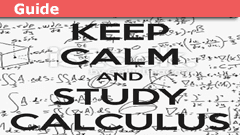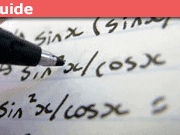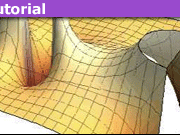A Guide to Self Study Calculus
Estimated Read Time: 4 minute(s)
Common Topics: book, calculus, topics, study, multivariable
Click For Complete Series
We often get questions here from people self-studying mathematics. One of those questions is what mathematics should I study and in what order. So in order to answer those questions, I have decided to make a list of topics a mathematician should ideally know and what prerequisites the topics have.
Table of Contents
Calculus
After high school stuff comes calculus. This includes:
- Differentiation
Differentiation is finding the tangent line to a specific function. You can deduce surprisingly many facts from this procedure.
Prerequisites: Basic stuff
Important topics:
a) Continuity
b) Limits
c) Derivatives
d) Rules for differentiation
e) Mean value theorem and consequences
f) Geometrical meaning of derivatives
g) Curve sketching
h) Rate of change - Integration
Integration is the opposite process of differentiation. Integration is used to find areas, lengths, and so much more.
Prerequisites: Differentiation
Important topics:
a) Indefinite integrals
b) Rules of indefinite integration
c) Definite integration
d) Rules for definite integration
e) Fundamental theorem of calculus
f) Application of integration to finding areas, volumes and lengths
g) Applications to physics - Sequences and series
Sequences and series are important for approximating certain functions. For example, the sine and the logarithm functions can be approximated very nicely with series.
Prerequisites: Differentiation and integration
Important topics:
a) Convergence of sequences
b) Converges of series
c) Special sequences and series
d) Convergence tests for series
e) Taylor series
f) Integration and differentiation with series - Multivariable calculus
Everything in single variable calculus of course also works in multiple dimensions. Prerequisites: single-variable calculus
Important topics:
a) Basic spatial geometry, like parametrization of lines and curves
b) Limits and continuity in multivariable functions
c) Differentiation of multivariable functions
d) Integration of multivariable functions
e) Multivariable Taylor series
f) Gradients and tangent planes
g) Maximization problems including Lagrange multipliers
h) Different coordinate systems
i) Vector calculus
My book recommendations for calculus:
The best calculus book is undoubted:
Elementary Calculus – An infinitesimal approach by Keisler
Freely available here: https://www.math.wisc.edu/~keisler/calc.html
This book takes you from elementary calculus to the standard topics in multivariable calculus. It even does this in two approaches, namely the standard and the nonstandard approach.
The nonstandard approach came first historically and involves infinitesimal numbers. Numbers so small that they’re not real numbers anymore. The tools of infinitesimals were used by many great mathematicians such as Euler and Gauss. Lately, they have fallen into disuse because mathematicians only want to work with real numbers (the standard approach). Nevertheless, mathematician Robinson has shown infinitesimals to be completely rigorous, and they are actually still used in physics and engineering (and it provides intuition in pure mathematics). So it is very beneficial to learn the nonstandard approach. While everybody thinks this book is valuable, many find it dangerous to teach the nonstandard approach only. This criticism is unfounded because the book treats both approaches. So you’ll be perfectly able to read a standard calculus/analysis book after Keisler.
This book covers:
- Limits
- Differentiation
- Integration
- Series
- Vectors
- Partial Differentiation
- Multiple Integrals
- Vector Calculus
- Some differential equations
If you’re familiar with basic high-school math, you will have no problems with this book. Many concepts like logarithms and trigonometric functions are even revised along the way. That said, a familiarity with proofs is recommended.
Now you may try to understand calculus in a somewhat more rigorous way. I recommend:
Calculus Deconstructed: A Second Course in First-Year Calculus by Nitecki
This does the entire calculus from a rigorous point of view. The theory is constructed the right way, and the exercises are very interesting. Especially the historical topics are very interesting.
This book covers:
- Sequences and their limits
- Continuity
- Differentiation
- Integration
- Power series
You can read this book if you already have read a book like Keisler.
After seeing single-variable calculus more rigorously, you might want to like to see multivariable calculus more rigorously. This is actually not strictly necessary, but it might help. One of the best books covering rigorous multivariable calculus is “calculus on manifolds” by Spivak, but this is a very brief book and counts more as analysis. So I will suggest a more readable resource, again by Nitecki:
Calculus in 3D: Geometry, vectors and multivariate calculus by Nitecki
Freely available here: http://www.tufts.edu/~znitecki/Hardcore2.pdf
If you enjoyed my previous recommendation of Nitecki, you will enjoy this too since this book is even better. It takes you from the very beginning of multivariable calculus to very far. For example, the very end of the book will discuss forms which are a very useful modern tool.
Everything is rigorously proved (but it’s not as harsh as an analysis book), although some proofs are put in an appendix.
This book covers:
- Coordinates and vectors (= baby linear algebra)
- Curves in space
- Differentiation of real-values functions
- Integration of real-valued functions
- Vector fields and forms
Read this book if you already know some rigorous single-variable calculus.
Finally, you may want to learn some differential equations:
Differential Equations by Ross
This is a marvelous book. It covers the main techniques of solving differential equations, but also quite some theoretical stuff. This book is truly a joy to read for a subject that is usually not so fun.
The book covers:
- Analytic solutions of first-order and higher-order ODE’s
- Series solutions
- Systems of linear ODEs
- Approximate Methods for ODEs
- Laplace Transform
- Existence and Uniqueness
- Sturm-Liouville theory and Fourier series
- Nonlinear differential equations
- Partial differential equations
You can read this book after the first encounter with single-variable calculus, but you’ll need some more for some topics.
Advanced education and experience with mathematics








Apostol's calculus books are fantastic for a first course on analysis, i.e. for a SECOND phase on calculus in the standard pedagogical sequence for most people who want to study mathematics formally. They are too dense to be useful for a first course on single or multi-variable calculus.
Dear micromass,
Have you read Apostol's calculus books? I want to know how they compare to the two Nitecki books you suggested in your guide? And also how Freidberg's Linear Algebra compares to Shilov's book on the same topic.
I wanted to go through calculus and then Linear Algebra following either of two paths:
a) Keisler's Infinitesmal approach>>>Nitecki Deconstructing Calculus>>>Nitecki Calculus in 3D>>>Freidberg's Linear Algebra
OR
b) Simmon's Calculus with analytic geometry>>>Apostol Vol 1>>>>Apostol Vol 2>>>>Shilov's Linear Algebra
It's a very nice book. But don't use it as first calculus book, since it's too difficult for that. It is very suitable as a second course though, if you enjoy the book.Can I skip first two chapters of third book if I followed the first book ?
[QUOTE=”Physicaa, post: 5382629, member: 585265″]Hi,
What is your opinion on Courant’s introduction books on calculus ?
Thanks[/QUOTE]
It’s a very nice book. But don’t use it as first calculus book, since it’s too difficult for that. It is very suitable as a second course though, if you enjoy the book.
Send me a PM, I might be able to help :)
[QUOTE=”micromass, post: 5307606, member: 205308″]What is your goal? What kind of book do you want?[/QUOTE]
I really want to understand the math behind quantum mechanics… :frown:
[QUOTE=”entropy1, post: 5307602, member: 169968″]Well, I’ll just have to buy another book then… :frown:[/QUOTE]
What is your goal? What kind of book do you want?
Well, I’ll just have to buy another book then… :frown:
[QUOTE=”entropy1, post: 5307366, member: 169968″]I just ordered the book of Mary Boas. How does that compare with these books?[/QUOTE]
It doesn’t compare at all with these books. They are very different. First of all, Boas does not cover single variable calculus. It starts with series and multivariable calculus. So it assumes you know integrals and derivatives already.
Second and most important, Boas is for physicists who don’t really care much about the underlying math. So if you want to know the math in detail, then Boas is not good. If you simply wish to use it as a tool, then Boas is truly an excellent resource.
Boas is a math methods for physics and engineering. It has less emphasis on theory, and goes over different subjects such as LA, DE’s, vector calc, basically everything an undergrad physics major will need. If you’re a physics major It will benefit you tremendously to work through it.
[QUOTE=”Remixex, post: 5305763, member: 562859″]Hmm interesting, of all those topics (it took me 2 semesters to get over them) the courses i took on the matter never talked about multi variable Taylor series, Laplace transform, or system of ODEs :c, maybe i should try to learn those on my own.
Also, about “vector calculus” section, does that mean Green’s, Gauss’ and Stokes’ theorem?
Very good, organized, and easy to read.
Cheers :D[/QUOTE]
Yes, vector calculus is stuff like Stokes’ theorem.
Of course it is very likely that your courses did not cover everything of this. I don’t think it is really absolutely necessary to go back and learn them on your own (unless you enjoy learning this stuff of course, in which case: go ahead). If you ever meet one of those topics later, you can still go back and learn them.
Hmm interesting, of all those topics (it took me 2 semesters to get over them) the courses i took on the matter never talked about multi variable Taylor series, Laplace transform, or system of ODEs :c, maybe i should try to learn those on my own.
Also, about “vector calculus” section, does that mean Green’s, Gauss’ and Stokes’ theorem?
Very good, organized, and easy to read.
Cheers :D
The texts are just his recommendations. And it makes much more sense to introduce differentiation before integration.
[QUOTE=”IGU, post: 5304566, member: 381937″]You seem to be presenting this as a “one true way”. [/QUOTE]
I don’t think I have said or implied anything remotely like that.
I will be learning calculus for the first time shortly and it’s nice to have a guide like this. Your posts are tremendously helpful for beginners like me, it is much appreciated!
Yes, very good! I will edit this in.
[QUOTE=”micromass, post: 5293482, member: 205308″]Thanks a lot PWiz, I appreciate it. If you think I’ve missed something, please do tell![/QUOTE]
IMHO, “parametric equations” and “calculus in different coordinate systems” (or something along those lines) should be included in the post somewhere under the Multivariable section, but other than that, I think your post pretty much covers all the bases.
Thanks a lot PWiz, I appreciate it. If you think I’ve missed something, please do tell!
Nice one micromass! I’ve always thought about what this kind of list should constitute, and you’ve covered it really well. Before this, I was forced to say “you need Calc I, II, III and DEs to understand physics well” to my friends, but had a really hard time explaining the contents of each in detail. Well, I have a great reference now:woot:
Nice to see Keisler's "An infinitesimal approach to calculus" in the list. Great post.
Hi,What is your opinion on Courant's introduction books on calculus ? Thanks
I just ordered the book of Mary Boas. How does that compare with these books?
Lest I be misunderstood in offering criticism, let me say thank you for doing this. It's a meritorious effort and will be helpful to many, I'm sure.My impression regarding it being presented as the "one true way" came from these statements:The best calculus book is undoubt[ed]ly…. (highly controversial)So it is very beneficial to learn the nonstandard approach. (controversial at best)But I agree those are not representative of the whole piece. However, the impression I get is that you think these textbook suggestions are right for everybody. I've found that people have different styles and need different things. Some love examples, some hate them. Some need rigor and others prefer intuition. Some like exercises aplenty, and others prefer a few well-chosen problems. Some want an answer key and others find it too tempting and prefer it doesn't exist. Some want their mathematics pure and others find it dry as dust if there isn't real world motivation.It would help, I think, if you indicate who your recommendations are for. If you really think they'll work for everybody, I'm suspicious.
You seem to be presenting this as a "one true way". For instance, you say differentiation is a prerequisite for learning integration. I'll note that Apostol does it the other way around, likely because historically that's the way it happened. Do you think that self-teaching from Apostol is a bad idea?I'm just thinking you might want to make the tone a bit more "here's one way to do it" than it is now. In any case, kudos on recommending free texts! That's certainly one thing Apostol's Calculus does not have going for it, regardless of how good it might be.
I'm afraid you posted a wrong link for the "Calculus in 3D: Geometry, vectors and multivariate calculus by Nitecki".This works better: http://www.tufts.edu/~znitecki/Hardcore2.pdf
I would like to share a recommendation: G.M. Fichtenholz "Differential and Integral Calculus". Fairly unpopular outside of the 'post-Soviet' countries, but it is among my personal favourites. A bit on the lengthy side, but it keeps a very approachable and 'eager to explain' tone just as easily when talking about basic differentiation and application of multi-variable functional series and transforms. Book genuinely 'feels' like a transcript from a very patient tutor. Plus it makes it a point to show worked-out examples to almost every single concept.It is also among the most complete resources when it comes for computational techniques, so if not for any other point it is still worth at least as a reference on solving problems.